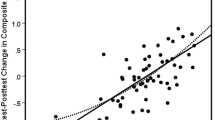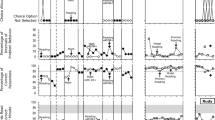Abstract
Drug abstinence studies indicate that escalating reinforcement schedules maintain abstinence for longer periods than fixed reinforcement schedules. The current study evaluated whether escalating reinforcement schedules would maintain more quiz taking than fixed reinforcement schedules. During baseline and for the control group, bonus points were distributed on random days for attending class. Following baseline, students in the fixed reinforcement section received 5 bonus points for each quiz completed while students in the escalating reinforcement received 3 bonus points for the first quiz with an increase of 0 or 1 point for each consecutive quiz completed. Results indicated that the escalating reinforcement schedule maintained quiz taking significantly longer than the fixed reinforcement schedule. The control group took the fewest number of quizzes. Students with good attendance took significantly more quizzes under the escalating reinforcement schedule than students with good attendance exposed to the fixed reinforcement schedule or control condition. This study demonstrates a potential novel application for escalating reinforcement schedules. Results indicate that escalating reinforcement schedules may be successfully applied to academic settings, but more research is needed.


Similar content being viewed by others
References
Bicard, D. F., Lott, V., Mills, J., Bicard, S., & Baylot-Casey, L. (2012). Effects of text messaged self-monitoring on class attendance and punctuality of at-risk college student athletes. Journal of Applied Behavior Analysis, 45, 205–210. doi:10.1901/jaba.2012.45-205.
Bufford, R. K. (1976). Evaluation of a reinforcement procedure for accelerating work rate in a self-paced course. Journal of Applied Behavior Analysis, 9, 208.
Credé, M., Roch, S. G., & Kieszczynka, U. M. (2010). Class attendance in college: A review of the relationship of class attendance with grades and student characteristics. Review of Educational Research, 80, 272–295. doi:10.3102/0034654310362998.
Donaldson, J. M., DeLeon, I. G., Fisher, A. B., & Kahng, S. W. (2014). Effects and preference for conditions of token earned versus token loss. Journal of Applied Behavior Analysis, 47, 537–548. doi:10.1002/jaba.135.
Kurti, A. N., & Dallery, J. (2013). Internet-based contingency management increases walking in sedentary adults. Journal of Applied Behavior Analysis, 46, 568–581. doi:10.1002/jaba.58.
Lee, M. S., Yu, C. T., Martin, T. L., & Martin, G. L. (2010). On the relation between reinforcer efficacy and preference. Journal of Applied Behavior Analysis, 43, 95–100.
Magoon, M. A., & Critchfield, T. S. (2008). Concurrent schedules of positive and negative reinforcement: Differential-impact and differential-outcomes hypotheses. Journal of the Experimental Analysis of Behavior, 90, 1–22. doi:10.1901/jeab.2008.90-1.
Michael, J. (1991). A behavioral perspective on college teaching. The Behavior Analyst, 14, 229–239.
Pace, G. M., Ivancic, M. T., Edwards, G. L., Iwata, B. A., & Page, T. J. (1985). Assessment of stimulus preference and reinforcer value with profoundly retarded individuals. Journal of Applied Behavior Analysis, 18, 249–255.
Patel, M. S., Asch, D. A., Troxel, A. B., Fletcher, M., Osman-Koss, R., Brady, J., et al. (2016). Premium-based financial incentives did not promote workplace weight loss in a 2013–15 study. Health Affairs (project Hope), 35, 71–79. doi:10.7326/M15-1635.
Perrin, C. J., Miller, N., Haberlin, A. T., Ivy, J. W., Meindl, J. N., & Neef, N. A. (2011). Measuring and reducing college students’ procrastination. Journal of Applied Behavior Analysis, 44, 463–474. doi:10.1901/jaba.2011.44-463.
Raj, J. D., Nelson, J. A., & Rao, K. S. P. (2006). A study on the effects of some reinforcers to improve performance of employees in a retail industry. Behavior Modification, 30, 848–866. doi:10.1177/0145445506273222.
Reiser, R. A. (1984). Reducing student procrastination in a personalized system of instruction course. Educational Communication and Technology Journal, 32, 41–49.
Roll, J. M., & Higgins, S. T. (2000). A within-subject comparison of three different schedules of reinforcement of drug abstinence using cigarette smoking as an exemplar. Drug and Alcohol Dependence, 58, 103–109.
Roll, J. M., Huber, A., Sodano, R., Chudzynski, J. E., Moynier, E., & Shoptaw, S. (2006). A comparison of five reinforcement schedules for use in contingency management-based treatment of methamphetamine abuse. The Psychological Record, 56, 67–81.
Romanowich, P., & Lamb, R. J. (2015). The effects of fixed versus escalating reinforcement schedules on smoking abstinence. Journal of Applied Behavior Analysis, 48, 25–37. doi:10.1002/jaba.185.
Shapiro, S. S., & Wilk, M. B. (1965). An analysis of variance for normality. Biometrica, 52, 591–611.
Acknowledgements
I would like to thank Alysia Potts for her hard work assisting with data entry and analysis.
Author information
Authors and Affiliations
Corresponding author
Appendix
Appendix
Posted Reminder for all Groups During Baseline
Reminder: You will earn bonus points for attendance on random class days. If you are in attendance on a random day that was selected at the beginning of the term, you will earn 5 bonus points.
Posted Reminder for Escalating Reinforcement Group
Reminder: You now earn bonus points for taking the weekly quiz by the due date and time. The more quizzes you take in a row the more bonus points you can earn. If you have more than two absences, you will not get access to the quizzes. It goes like this:
If you complete 1 in a row: 3 points |
If you complete 2 in a row: 3 points |
If you complete 3 in a row: 4 points |
If you complete 4 in a row: 4 points |
if you complete 5 in a row: 5 points |
If you complete 6 in a row: 6 points |
If you complete 7 in a row: 7 points |
If you complete 8 in a row: 8 points |
So if you take Quiz 1 and Quiz 2 you are set to earn 4 bonus points for taking Quiz 3.
Posted Reminder for Fixed Reinforcement Group
Reminder: You now earn bonus points for taking the quizzes. You will earn 5 bonus points for each quiz completed by the due date and time.
Posted Reminder for Control Group
Reminder: You continue to earn bonus points for attendance on random class days. If you are in attendance on a bonus day that was selected at the beginning of the term, you will earn 5 bonus points.
Rights and permissions
About this article
Cite this article
Mahoney, A. A Comparison of Escalating Versus Fixed Reinforcement Schedules on Undergraduate Quiz Taking. J Behav Educ 26, 264–276 (2017). https://doi.org/10.1007/s10864-017-9268-5
Published:
Issue Date:
DOI: https://doi.org/10.1007/s10864-017-9268-5




